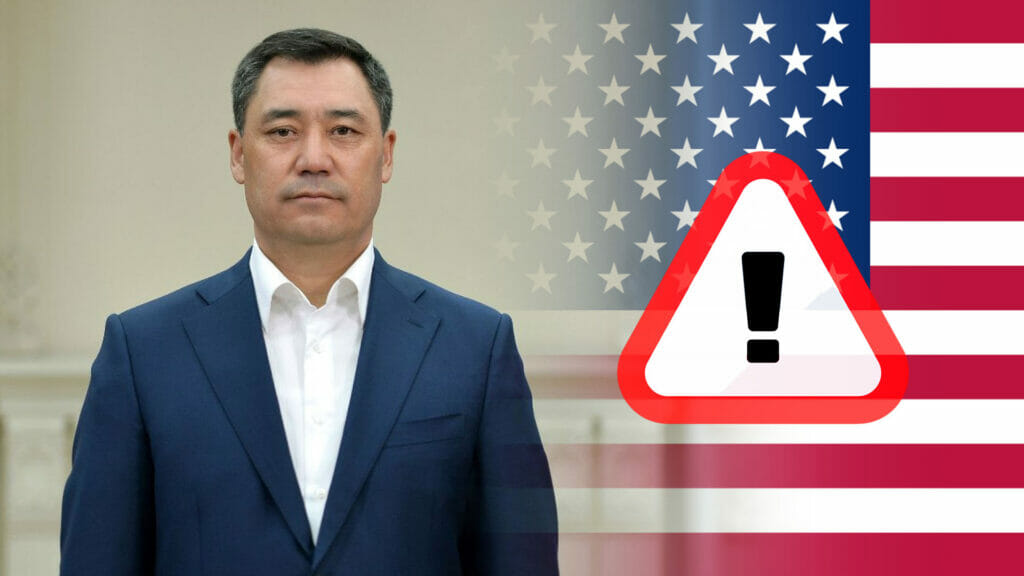President Japarov says that he sees letter by US senator criticizing Kyrgyzstan as pressure on his country

Japarov said that Kyrgyzstan will pursue a multi-vector foreign policy / Photo: gov.kg and freepik
President of Kyrgyzstan Sadyr Japarov said that he regards the letter of U.S. Senator Bob Menendez as an attempt to put pressure on Kyrgyzstan and win over the country’s support. However, Kyrgyzstan will continue to remain neutral in the war between Russia and Ukraine, the president said in an interview with the Kabar news agency.
What did President Japarov say?
«As for the senator’s letter, I receive letters from many prominent politicians. I regard this letter as a common excuse to put pressure on Kyrgyzstan and win us over to their side. But we will not allow this. We are an independent country. We will continue to pursue equal relations with all countries. We will pursue a multi-vector foreign policy. Concerning the war between Russia and Ukraine, we’ve said that our position is neutral since the very beginning of the conflict. We are going to stick to this position. The situation won’t change in either direction if we change our position. It doesn’t depend on us,» Japarov added.
He also spoke about the case of Chinese drones that were supplied to Russia by a Kyrgyz company.
«Neither Russia nor China depends on small Kyrgyzstan. These countries are neighbors. They share 4,000 kilometers of common border. Russia can bring whatever it wants from China by railway or by sea. Indeed, Kazakhstan seized drones from a Kyrgyz company. The company explained to us that these drones were intended for agricultural purposes. Despite this, we no longer allow the export of drones and unmanned aerial vehicles,» he stated.
What was written in the senator’s letter?
Menendez, who is a chairman of the Senate Foreign Relations Committee, wrote to Japarov that Kyrgyzstan assisted Russia or its proxies in evading international sanctions imposed on Russia.
«I urge your government to immediately investigate these serious allegations of sanctions evasion and to establish more reliable, robust processes to prevent the illicit flow of goods through your territory,» he wrote.
Menendez also wrote that he feared that Kyrgyzstan’s failure to uphold international sanctions on Russia is simply a symptom of its continued democratic backsliding and widespread human rights violation.
«A once shining beacon of democracy in Central Asia, the Kyrgyz Republic is headed down a dangerous path toward autocracy. I urge you to lift all restrictions on independent media and journalists, release imprisoned human rights defenders, and repeal measures restricting fundamental freedoms such as the freedom of association,» he said.
What sanctions have the U.S. imposed on Kyrgyzstan?
On July 20, the United States imposed sanctions against four Kyrgyz companies that were accused of illegal export of electronic components and technologies for recipients in Russia including its defense sector. In an official response, the State Committee for National Security of Kyrgyzstan said that neither the Kyrgyz state nor its agencies and companies were involved in illegal exports to Russia, although it promised to investigate the case of illegal exports of electronic products.
Ukraine also noticed sanctions against Kyrgyz companies. The Ukrainian Ministry of Foreign Affairs summoned Idris Kadyrkulov, the Kyrgyz ambassador to Kyiv, and declared that Ukraine would qualify Kyrgyzstan’s re-export of sensitive goods to Russia as a hostile action.
What does this case have to do with Kazakhstan?
In May 2023, several media outlets reported that a Kyrgyz company tried to illegally export a bunch of drones to Russia through the territory of Kazakhstan. As a result, Kazakhstani border guards seized 14 drones. According to the trade portal’s official data, each drone cost $13,450. The customs service discovered that the Kyrgyzstani supplier didn’t have a license for exports of that drones, which led to their confiscation by Kazakh authorities.

